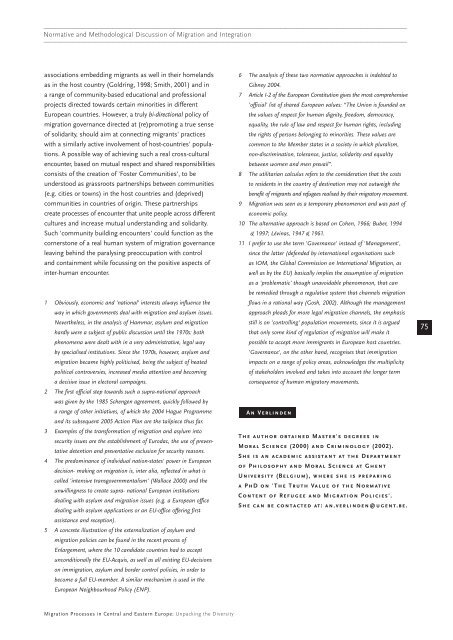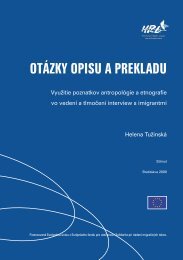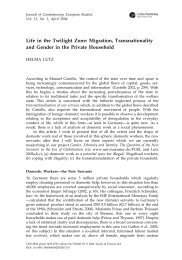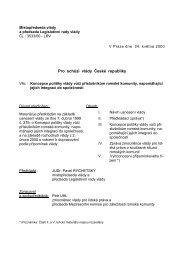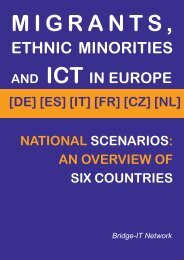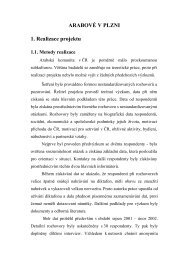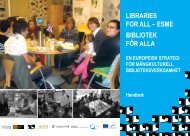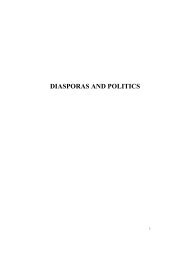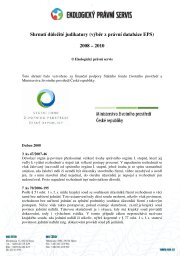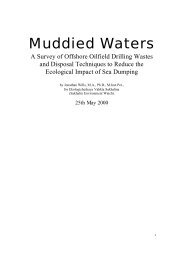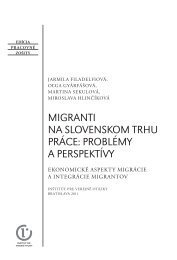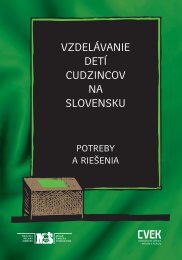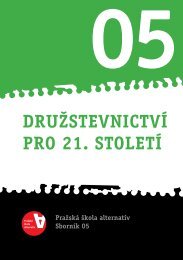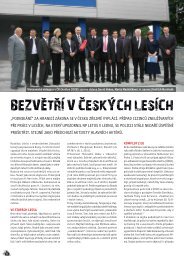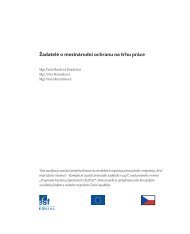Migration Processes in Central and Eastern Europe - Multiple Choices
Migration Processes in Central and Eastern Europe - Multiple Choices
Migration Processes in Central and Eastern Europe - Multiple Choices
You also want an ePaper? Increase the reach of your titles
YUMPU automatically turns print PDFs into web optimized ePapers that Google loves.
———————————————————————————————————————————————————————————————<br />
Normative <strong>and</strong> Methodological Discussion of <strong>Migration</strong> <strong>and</strong> Integration<br />
———————————————————————————————————————————————————————————————<br />
associations embedd<strong>in</strong>g migrants as well <strong>in</strong> their homel<strong>and</strong>s<br />
as <strong>in</strong> the host country (Goldr<strong>in</strong>g, 1998; Smith, 2001) <strong>and</strong> <strong>in</strong><br />
a range of community-based educational <strong>and</strong> professional<br />
projects directed towards certa<strong>in</strong> m<strong>in</strong>orities <strong>in</strong> different<br />
<strong>Europe</strong>an countries. However, a truly bi-directional policy of<br />
migration governance directed at (re)promot<strong>in</strong>g a true sense<br />
of solidarity, should aim at connect<strong>in</strong>g migrants' practices<br />
with a similarly active <strong>in</strong>volvement of host-countries' populations.<br />
A possible way of achiev<strong>in</strong>g such a real cross-cultural<br />
encounter, based on mutual respect <strong>and</strong> shared responsibilities<br />
consists of the creation of 'Foster Communities', to be<br />
understood as grassroots partnerships between communities<br />
(e.g. cities or towns) <strong>in</strong> the host countries <strong>and</strong> (deprived)<br />
communities <strong>in</strong> countries of orig<strong>in</strong>. These partnerships<br />
create processes of encounter that unite people across different<br />
cultures <strong>and</strong> <strong>in</strong>crease mutual underst<strong>and</strong><strong>in</strong>g <strong>and</strong> solidarity.<br />
Such 'community build<strong>in</strong>g encounters' could function as the<br />
cornerstone of a real human system of migration governance<br />
leav<strong>in</strong>g beh<strong>in</strong>d the paralys<strong>in</strong>g preoccupation with control<br />
<strong>and</strong> conta<strong>in</strong>ment while focuss<strong>in</strong>g on the positive aspects of<br />
<strong>in</strong>ter-human encounter.<br />
1 Obviously, economic <strong>and</strong> 'national' <strong>in</strong>terests always <strong>in</strong>fluence the<br />
way <strong>in</strong> which governments deal with migration <strong>and</strong> asylum issues.<br />
Nevertheless, <strong>in</strong> the analysis of Hammar, asylum <strong>and</strong> migration<br />
hardly were a subject of public discussion until the 1970s: both<br />
phenomena were dealt with <strong>in</strong> a very adm<strong>in</strong>istrative, legal way<br />
by specialised <strong>in</strong>stitutions. S<strong>in</strong>ce the 1970s, however, asylum <strong>and</strong><br />
migration became highly politicised, be<strong>in</strong>g the subject of heated<br />
political controversies, <strong>in</strong>creased media attention <strong>and</strong> becom<strong>in</strong>g<br />
a decisive issue <strong>in</strong> electoral campaigns.<br />
2 The first official step towards such a supra-national approach<br />
was given by the 1985 Schengen agreement, quickly followed by<br />
a range of other <strong>in</strong>itiatives, of which the 2004 Hague Programme<br />
<strong>and</strong> its subsequent 2005 Action Plan are the tailpiece thus far.<br />
3 Examples of the transformation of migration <strong>and</strong> asylum <strong>in</strong>to<br />
security issues are the establishment of Eurodac, the use of preventative<br />
detention <strong>and</strong> preventative exclusion for security reasons.<br />
4 The predom<strong>in</strong>ance of <strong>in</strong>dividual nation-states' power <strong>in</strong> <strong>Europe</strong>an<br />
decision- mak<strong>in</strong>g on migration is, <strong>in</strong>ter alia, reflected <strong>in</strong> what is<br />
called '<strong>in</strong>tensive transgovernmentalism' (Wallace 2000) <strong>and</strong> the<br />
unwill<strong>in</strong>gness to create supra- national <strong>Europe</strong>an <strong>in</strong>stitutions<br />
deal<strong>in</strong>g with asylum <strong>and</strong> migration issues (e.g. a <strong>Europe</strong>an office<br />
deal<strong>in</strong>g with asylum applications or an EU-office offer<strong>in</strong>g first<br />
assistance <strong>and</strong> reception).<br />
5 A concrete illustration of the externalization of asylum <strong>and</strong><br />
migration policies can be found <strong>in</strong> the recent process of<br />
Enlargement, where the 10 c<strong>and</strong>idate countries had to accept<br />
unconditionally the EU-Acquis, as well as all exist<strong>in</strong>g EU-decisions<br />
on immigration, asylum <strong>and</strong> border control policies, <strong>in</strong> order to<br />
become a full EU-member. A similar mechanism is used <strong>in</strong> the<br />
<strong>Europe</strong>an Neighbourhood Policy (ENP).<br />
6 The analysis of these two normative approaches is <strong>in</strong>debted to<br />
Gibney 2004.<br />
7 Article I-2 of the <strong>Europe</strong>an Constitution gives the most comprehensive<br />
'official' list of shared <strong>Europe</strong>an values: “The Union is founded on<br />
the values of respect for human dignity, freedom, democracy,<br />
equality, the rule of law <strong>and</strong> respect for human rights, <strong>in</strong>clud<strong>in</strong>g<br />
the rights of persons belong<strong>in</strong>g to m<strong>in</strong>orities. These values are<br />
common to the Member states <strong>in</strong> a society <strong>in</strong> which pluralism,<br />
non-discrim<strong>in</strong>ation, tolerance, justice, solidarity <strong>and</strong> equality<br />
between women <strong>and</strong> men prevail”.<br />
8 The utilitarian calculus refers to the consideration that the costs<br />
to residents <strong>in</strong> the country of dest<strong>in</strong>ation may not outweigh the<br />
benefit of migrants <strong>and</strong> refugees realised by their migratory movement.<br />
9 <strong>Migration</strong> was seen as a temporary phenomenon <strong>and</strong> was part of<br />
economic policy.<br />
10 The alternative approach is based on Cohen, 1966; Buber, 1994<br />
& 1997; Lév<strong>in</strong>as, 1947 & 1961.<br />
11 I prefer to use the term 'Governance' <strong>in</strong>stead of 'Management',<br />
s<strong>in</strong>ce the latter (defended by <strong>in</strong>ternational organisations such<br />
as IOM, the Global Commission on International <strong>Migration</strong>, as<br />
well as by the EU) basically implies the assumption of migration<br />
as a 'problematic' though unavoidable phenomenon, that can<br />
be remedied through a regulative system that channels migration<br />
flows <strong>in</strong> a rational way (Gosh, 2002). Although the management<br />
approach pleads for more legal migration channels, the emphasis<br />
still is on 'controll<strong>in</strong>g' population movements, s<strong>in</strong>ce it is argued<br />
that only some k<strong>in</strong>d of regulation of migration will make it<br />
possible to accept more immigrants <strong>in</strong> <strong>Europe</strong>an host countries.<br />
'Governance', on the other h<strong>and</strong>, recognises that immigration<br />
impacts on a range of policy areas, acknowledges the multiplicity<br />
of stakeholders <strong>in</strong>volved <strong>and</strong> takes <strong>in</strong>to account the longer term<br />
consequence of human migratory movements.<br />
An Verl<strong>in</strong>den<br />
The author obta<strong>in</strong>ed Master's degrees <strong>in</strong><br />
Moral Science (2000) <strong>and</strong> Crim<strong>in</strong>ology (2002).<br />
She is an academic assistant at the Department<br />
of Philosophy <strong>and</strong> Moral Science at Ghent<br />
University (Belgium), where she is prepar<strong>in</strong>g<br />
a PhD on 'The Truth Value of the Normative<br />
Content of Refugee <strong>and</strong> <strong>Migration</strong> Policies'.<br />
She can be contacted at: an.verl<strong>in</strong>den@ugent.be.<br />
75<br />
<strong>Migration</strong> <strong>Processes</strong> <strong>in</strong> <strong>Central</strong> <strong>and</strong> <strong>Eastern</strong> <strong>Europe</strong>: Unpack<strong>in</strong>g the Diversity


